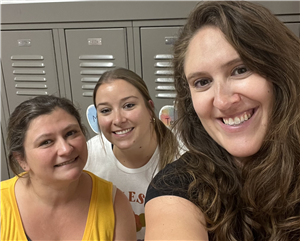KINDERGARTEN CLASSROOM INFORMATION
-
Welcome to our Kindergarten Classroom. Kindergarten is our favorite grade level to teach! YOUR child will make tremendous gains this year. In our classroom, we will use hands-on materials and work to encourage social, emotional, and academic skills throughout the school year.

Curriculum:Our classroom will use research-based curriculum and instructional strategies that will foster individual growth in the core academic areas outlined in St. Paul's district curriculum.
Reading: We provide a balanced approach to reading in the kindergarten classroom. We will use the district’s Mondo Bookshop program and a verity of other materials along with student interests to implement Reader’s Workshop. This aligns to the elements of reading as identified by the National Reading Panel: phonemic awareness, phonics/word study, vocabulary, comprehension, fluency, and oral language. We will teach these important skills in a whole group setting, small group setting, and one on one settings. We will monitor your child’s growth through assessments and target our instruction to meet your child’s growth. We want to bring literacy to your child in an approach that not only meets his/her skills, but also encourages great conversations and a love for literacy.
Writing: Reading and Writing go hand in hand in kindergarten. Our day will also include our Writer’s Workshop time. The workshop model will include a mini-lesson, independent writing time, and wrap up with the sharing of our work. We will use the district’s writing curriculum based on the work of Horn and Giacobbe, as well as Lucy Calkins. The kindergarten students will work through the units of study: Storytelling and Labeling, Telling/Drawing Our Stories, Pattern Books, Personal Narrative, Expert Books, Eric Carle Author Study, Poetry, and How-To Books. These areas of study will expose your child to narrative writing, informational writing, opinion writing, procedural writing, and writing a response to literature. We will be using drawings, labels, inventive spelling, and sight words tocommunicate our thoughts and ideas on paper. It is so important that students believe they are writers and are not stopped by “correct spelling”. We go through the same process when learning to talk. We celebrate each new attempt at vocal communication. We are not told to stop because it is not perfect. We build on what we know and go from there.
Math: During our Math Workshop, we will use the district’s Everyday Mathematics program as well as other best practices and resources to teach and explore basic math concepts. Everyday Mathematics is about numbers, shapes, and patterns. It is counting, sorting, patterning, estimating, graphing, measuring things, discovering similarities and differences, and solving problems. Activities are designed to be learned in a whole group, with a partner, and on our own at times. We will continue to use assessments provided by the district to monitor your child’s growth. Our goal is to make connections to the real world and be able to show and explain those connections using mathematical thinking, symbols, and terms.
Active Learning :In kindergarten, active learning is centered on the themes or areas of study we are working on in the classroom. It is often referred to as “Play” or “Center time”. The area of study will often be connected to the seasons, social studies standards, science standards and or student lead interests. In our classroom, each area of play including House, Blocks, Art, Writing, Sensory, and Specialty Theme Center, will have a literacy and or math activity to explore as the children actively “play” or practice their new learning.
Personal and Social Skills In kindergarten: We will work on personal and social skills every day in our classroom. Learning to work together, sharing, and taking turns are fundamental parts of school. Children are also learning how to listen to others and respond appropriately when questions are asked. Using the Responsive Classroom approach helps build our classroom community. We will also include a Take Break Area in our classroom that everyone will use at some point this year, including me. This is not a punishment, but rather a tool to calm our bodies and brains. We will teach the breathing ball and have visual prompts available to the students to use as we make the connection between our bodies and minds. Kindergartners are getting more independent. They are finding out how to do things on their own--things that used to require adult assistance. We honor their risk taking and encourage this growth within a safe and caring environment.






